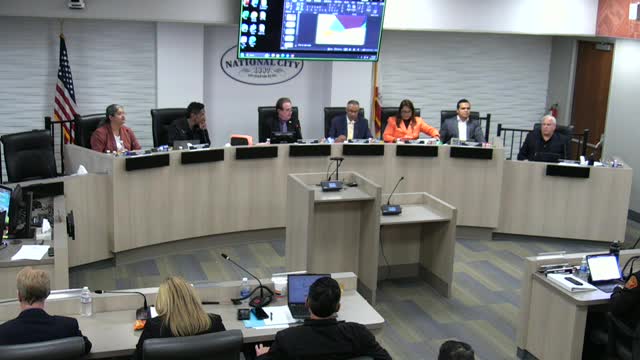National City council upholds planning commission denial of USD Clean Fuels depot after hours of testimony
Get AI-powered insights, summaries, and transcripts
Subscribe
Summary
The National City Council voted unanimously on Nov. 4 to deny a proposed USD Clean Fuels transfer facility, upholding the Planning Commission's denial after extensive public testimony and council questioning about enforceability and local air impacts.
The National City Council voted unanimously on Nov. 4 to deny a proposed USD Clean Fuels transfer facility, upholding the Planning Commission's earlier denial after more than four hours of public testimony and extended council deliberation.
The council's decision came after staff and the applicant presented new mitigation conditions intended to reduce diesel combustion and PM2.5 emissions tied to the project. Those measures included a five-year schedule to achieve emissions reductions and offsets, a program to supply high-efficiency portable air filters to nearby residences, and a 10-year tree-planting commitment focused on the Portside community. Bill Fierking, representing USD Clean Fuels, told the council: "We were asked at the last hearing to really focus on...diesel combustion emissions associated with this project," and described the company's willingness to provide monitoring and programmatic steps aimed at reducing impacts.
Despite the added commitments, a large majority of speakers urged the council to reject the project. Claire Gubner of Olivewood and other community groups argued the facility would concentrate pollution near homes and schools, including Kimball Elementary, and that offsets and tree plantings would not adequately protect residents. "We're urging you to say no to USDC fuels tonight," Gubner said. Public-health and education officials echoed the concern: "When you make your decision tonight, we are asking you to deny the fuel station and put children at the center of that decision," said Dr. LeAngela Brady, superintendent of the National School District.
Council members questioned applicants about operational details the community had highlighted, including the expected distribution of truck deliveries during off-peak hours, locomotive emissions on the BNSF line, and the enforceability of the proposed conditions. Council members repeatedly stressed the quasi-judicial nature of the appeal and the need to rely on evidence in the record. Council discussion noted three recurring themes: (1) uncertainty whether the proposed conditions could be enforced or met within the five-year window; (2) the risk of concentrating new diesel activity in an already overburdened community; and (3) dependence on third parties (railroad operators and trucking firms) to achieve emissions and operational changes.
The council's vote to deny was recorded as unanimous. The council took the action that will preserve the Planning Commission's denial and prevent the city from issuing the conditional use permit, coastal development permit and certification of the project EIR at this time.
What the applicant had offered: USD Clean Fuels's team proposed five newly drafted conditions since the prior hearing: 1) achieve a 100% reduction/offset of baseline diesel-combustion emissions modeled in the EIR within five years; 2) secure a 50% reduction in baseline diesel PM2.5 emissions within five years; 3) provide up to 100 portable HEPA air purifiers and replacement filters for residential units within 1,000 feet of the project; 4) provide at least 100 trees per year for 10 years prioritized for the Portside community; and 5) submit annual emissions-reduction status reports beginning after the second full year of operations until commitments are met. Fierking told the council these measures were intended to be enforceable permit conditions and said, "our intent is to meet the objectives set forth in there."
Why opponents opposed the project: Residents, health professionals, community organizations and school officials argued the proposed mitigation does not address cumulative impacts and that offsets, filters and young trees are inadequate substitutes for preventing diesel pollution near homes and a school. Several commenters cited the lack of local air-monitoring data and said the EIR relied on monitoring locations that do not reflect local conditions. Public-health speakers — including UC San Diego medical students and pediatricians for clean air — emphasized that particulate pollution carries acute and chronic health risks for children and that portable filters do not protect children outdoors, on the walk to school or in community spaces.
Implementation and next steps: With the denial, city staff will coordinate the formal written finding sustaining the Planning Commission's action; no permit will be issued. Councilmembers who supported the denial urged staff to continue regional engagements that address freight and rail pollution and to pursue stronger enforcement of local truck idling and route compliance, and asked staff to continue discussions with state and regional agencies to reduce emissions across the corridor.
The council also asked staff to continue outreach on broader solutions for the West Side's historically high pollution burdens and to work with stakeholders, including the Port of San Diego and Caltrans, to identify regional actions that would reduce diesel exposure across neighborhoods.
Votes at a glance: Motion to deny the appeal and uphold the Planning Commission's denial '024-11-04: approved unanimously (5-0).
